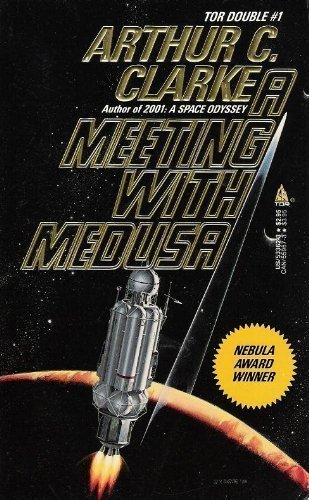
![]() A Meeting with Medusa by Arthur C. Clarke
A Meeting with Medusa by Arthur C. Clarke
If speculative fiction has any stranglehold on literature, it’s the lack of limitations to the question: what if? Fantasy is a complete expression of this facet, while science fiction tugs lightly on the reins lest the imagination escape reality entirely. In Arthur C. Clarke’s 1971 novella A Meeting with Medusa, Jupiter is that reality. Clarke penned the novella for anyone who ever wondered what being in the gas giant’s atmosphere might be like. It is awash with vivid visuals, but the fantastic elements threaten to run away with the story.
Howard Falcon is a top dirigible pilot, and at the outset of the story is found captaining the world’s largest dirigible, Queen Elizabeth IV, above the Grand Canyon. Piloting this 1,500-foot-long, multi-chambered blimp is no easy task, so when scientists plan the first manned trip into Jupiter’s atmosphere, Falcon is their choice for pilot. A significant percentage of the unmanned probes have disappeared exploring the planet. Falcon is aware of the risk, but is willing to take it for the glory of being the first human in Jovian skies. His planetary entry is successful, and what he discovers thereafter belongs truly to speculative fiction.
The greatest success of A Meeting with Medusa is the sensuality of place. The description of Jupiter’s atmosphere is rich, and Clarke gives the reader a strong impression of what it might be like traveling the chemical clouds and swirls of gas. Electrical storms are a regular phenomenon on the gas giant; Falcon’s experiences of St. Elmo’s fire, radiating spokes of electrical light, and the pulses of color emanating from deep below on the invisible surface are almost palpable, making one yearn for a similar viewport on Earth.
But given that this novella is Silver Age material, the titular “Medusa,” when it appears, drains a bit of the story’s integrity. Extrapolation becomes speculation, and exploration becomes adventure. Strongly in the vein of Jules Verne’s brand of sci-fi (particularly given the dirigible aspect), Clarke channels the originator of such voyages extraordinaire to effective yet unnatural effect.
In the end, A Meeting with Medusa is a good but not great novella rooted in hypotheses on what being in Jupiter’s atmosphere might be like. Clarke tosses in a couple of sci-fi conceits to spice up the story, and what results is a vivid Silver Age imagining of life on our solar system’s largest planet. He effectively builds a sense of wonder, and there is even time for a little post-humanism…



Do it! One of the best things I've read in recent years.
This reminds me. I want to read Addie LaRue.
We’re in total agreement David!
I felt just the same. The prose and character work was excellent. The larger story was unsatisfying, especially compared to…
Hmmm. I think I'll pass.